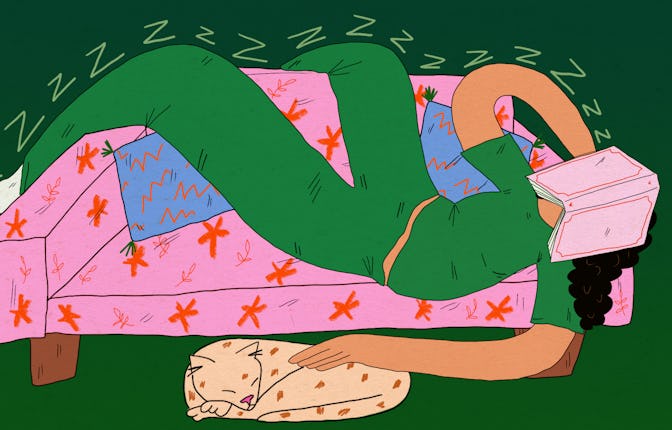Here's how you might be able to finally remember people's names
It’s so easy you could do it in your sleep. Literally.

You know that feeling you get when you see someone you know and it’s way past the time when it’s appropriate for you to ask their name? That feeling sucks for all involved, including the friend you rope in to casually introduce themselves. So many of us struggle to remember people’s names that it’s the subject of roughly a zillion articles and podcasts. But, luckily, a new study suggests that your brain may finally be able to learn to put names to faces in your sleep.
The small but fascinating study, which was published yesterday in the journal NPJ: Science of Learning, was conducted at Northwestern University. Here’s how it worked: Researchers asked 24 people to try to memorize pictures of 80 faces and corresponding names. Participants were told that half of the students were students in a Latin American history class and that the others were students in a Japanese history class. Then scientists hooked up each volunteer to an EEG machine (that measures brain waves) and invited them to take a nap.
Researchers watched the brain waves of participants as they slept and once they showed that the person was in deep sleep, they played the names of the “students,” and played music from the culture they were supposedly studying — ie: Japanese or Latin American music. Researchers found that the people with the longest periods of deep sleep had the best memory recall.
"When our participants woke up, they were relatively better at recognizing people's faces and remembering their names — compared to memory for faces and names not reactivated during sleep," Ken Paller, a professor of psychology and one of the authors on the study, told CNN. "Our study showed that when memories are reactivated during sleep, memory abilities can be improved after you wake up.” In other words, hearing the names and music associated with them helped sleeping people remember names once they were awake.
The results are kind of dramatic in that participants who were played the names and music were able to remember an average of one and a half more names than they did before they slept, according to the study.
But, there is a catch: The experiment was only successful at helping people remember names if their sleep wasn’t disturbed. That means that the quality of sleep that participants got made a difference in their ability to remember names.
While this study is small, it is very exciting to imagine how much we may be able to learn in our sleep.
Unfortunately, this study isn’t easy to replicate at home, but scientists are working on ways that people can use what science is learning about sleep. Even if we can’t buy a tape that will help us remember names immediately, this study still helps us understand something really important about sleep — quality matters when it comes to how we actually function in our daily lives. "Through high-quality sleep, our memories are more likely to be available when we need them, so that we can use them to support decision-making, creativity and problem-solving," Paller told CNN.
While this study is small, it is very exciting to imagine how much we may be able to learn in our sleep. And while the impact of high quality sleep on our ability to learn and ability to communicate are all well documented in scientific literature, maybe this important addition can help shift our cultural conversation away from productivity and towards rest as an important and practical way to live better.